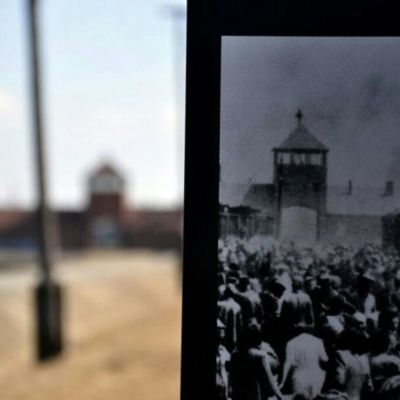The official podcast of the Auschwitz Memorial. The history of Auschwitz is exceptionally complex. It combined two functions: a concentration camp and an extermination center. Nazi Germany persecuted various groups of people there, and the camp complex continually expanded and transformed itself. In the podcast "On Auschwitz," we discuss the details of the history of the camp as well as our contemporary memory of this important and special place. We kindly ask you to support our mission and share our podcast in social media. Online lessons: http://lesson.auschwitz.org
http://www.auschwitz.org
Gesamtlänge aller Episoden: 1 day 56 minutes
episode 11: "On Auschwitz" (11): Sport and sportspeople in Auschwitz
The term "sport" in KL Auschwitz was distorted by using it to refer to the exhausting exercises combined with the drill and singing applied on a mass scale. This form of sport, referred to after the war as pseudo-sport, was usually a way of enforcing discipline and punishing prisoners.
However, among people deported by the Germans to Auschwitz, there were pre-war sportsmen and sportswomen: Olympians and national champions...
episode 12: "On Auschwitz" (12): Polish and Jewish prisoners in the camp
During its entire existence, slightly over 400 thousand people were registered at Auschwitz as prisoners - including 131 thousand women. The two largest groups of prisoners were Jews - about 200 thousand - and Poles, some 140 thousand.
Since Germans established the camp in spring 1940 with the members of Polish resistance and intelligentsia in mind, Poles dominated in the camp at first...
episode 13: "On Auschwitz" (13): The fate of Sonderkommando prisoners
One of the darkest chapters of the history of Auschwitz is undoubtedly the story of the Sonderkommando - a group of prisoners, mainly Jews - forced by the Germans to work in gas chambers and crematoria of the camp.
Prisoners assigned to this unit, employed in places of mass extermination, could not refuse to do their work or ask to be transferred to perform other tasks in the camp. Failure to carry out the instructions of the SS would result in immediate death.
Dr...
episode 14: "On Auschwitz" (14): Starvation and slave labour of Auschwitz prisoners
Two extremely important factors in the exhaustion, deprivation and destruction of prisoners at Auschwitz were hunger and hard slave labour.
Dr. Jacek Lachendro of the Auschwitz Memorial Research Centre talks in our podcast about this aspect of the camp's functioning.
---
Listen also to the podcast about living and sanitary conditions as well as camp clothing: https://anchor...
episode 15: "On Auschwitz" (15): The camp through eyes of a child
The fate children who were registered in Auschwitz as prisoners was no different in principle from that of adults. Just like them, they suffered from hunger and cold, were used as laborers, and were punished, put to death, and used as subjects in criminal experiments by SS doctors.
Dr. Wanda Witek-Malicka from Memorial’s Research Center talks about the Auschwitz camp through the eyes of a child.
---
Listen also to the podcast "Children in Auschwitz": https://anchor...
episode 16: "On Auschwitz" (16): The research on the number of victims of the camp
The historians of the Memorial today estimate, that the Germans murdered around 1,1 million out of 1,3 million people deported to Auschwitz.
Dr. Piotr Setkiewicz, the head of the Museum Research Centre, talks about the history of research on the number of Auschwitz victims.
episode 17: "On Auschwitz" (17): prisoners with purple triangles - Jehovah’s Witnesses in Auschwitz
Activities by the Jehovah’s Witnesses were banned in the Third Reich in 1933 because of the Witnesses’ religious principles and pacifistic views, as well as their organization’s international connections. As a result, many of them were imprisoned in concentration camps.
Teresa Wontor-Cichy from the Auschwitz Memorial Research Center talks about the history and fate of some 400 Jehovah’s Witnesses incarcerated in the camp...
episode 18: "On Auschwitz" (18): sub-camps
The Auschwitz concentration camp had almost 50 sub‑camps. The largest of them had extensive administrative structures, separate hospital barracks, showers and even small crematoria. In the smaller ones, prisoners were locked up for the night in rooms or cellars—there were no fences or guard towers there and meals were delivered from the main camp. The majority of prisoners were employed in the armaments and extractive industries, or agriculture...
episode 19: "On Auschwitz" (19): registration photographs of Auschwitz prisoners
In the thousands of preserved registration photographs of Auschwitz prisoners, we can see faces of the men and women imprisoned in the camp.
Dr Wojciech Płosa, the head of Auschwitz Memorial Archives, talks about the history of these photographs.
episode 20: "On Auschwitz" (20): SS garrison in the Auschwitz camp
During the time of operation of Auschwitz, some 8,100-8,200 SS men worked there as part of the camp garrison. In our podcast Dr. Piotr Setkiewicz, the head of Research Center of the Auschwitz Memorial, talks about functioning of the SS garrison in the Auschwitz camp complex, its organizational structure and everyday work in the management, functioning, and isolation of the camp.
We also recommend our online lesson: http://lekcja.auschwitz.org/2021-zaloga-en/
